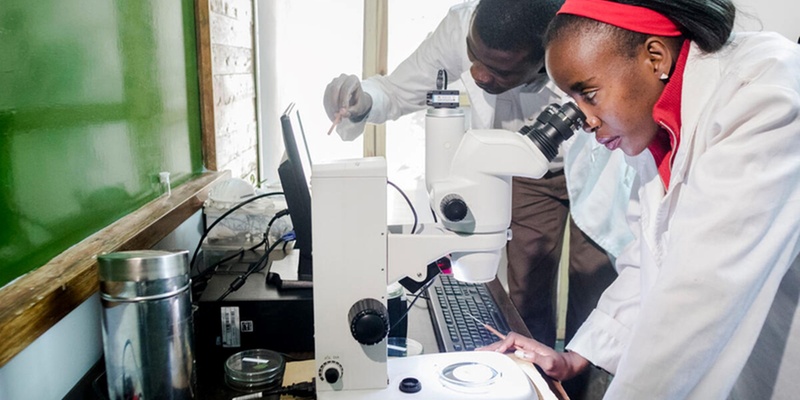Plusieurs pays africains vont améliorer leurs systèmes commerciaux et valoriser leurs ressources agricoles
Posted on mer, 30 Avr 2025, 08:44

Des fonctionnaires chargés de la quarantaine examinent un échantillon dans un laboratoire au Zimbabwe © FAO/Jekesai Njikizana
Rome, 18 avril 2025 – Plusieurs pays d’Afrique orientale et australe prévoient de réformer en profondeur leurs systèmes commerciaux et leurs dispositifs de quarantaine, afin de prévenir la dissémination des organismes nuisibles agricoles et de tirer parti des vastes ressources naturelles du continent, qui offrent un important potentiel d’exportation.
Lors d’une récente réunion à Rome, des responsables de onze pays du Marché commun de l’Afrique orientale et australe (COMESA) ont présenté en détail les mesures qu’ils comptent prendre pour maintenir la confiance du reste du monde dans la sécurité de leurs exportations de végétaux et de produits végétaux.
Ces mesures ont été élaborées après plusieurs mois de travail dans le cadre d’évaluations des capacités phytosanitaires (ECP), qui visaient à déterminer les lacunes des systèmes de biosécurité des pays concernés, avec l’appui du Secrétariat de la Convention internationale pour la protection des végétaux (CIPV).
La responsable de l’Unité chargée de la facilitation de la mise en œuvre du Secrétariat de la CIPV, Sarah Brunel, a expliqué que l’étendue des terres et la disponibilité de la main-d’œuvre en Afrique constituaient des atouts majeurs pour accroître la production et les exportations agricoles.
«Avec des cadres réglementaires et procéduraux appropriés, ces pays peuvent répondre à la demande mondiale croissante en produits frais et d’origine végétale», a souligné Mme Brunel.
Les pays ont ainsi présenté leurs projets visant à réformer la législation agricole, améliorer les procédures opérationnelles, réorganiser les ministères chargés du commerce, renforcer les capacités en matière d’inspection, d’analyse du risque et de surveillance, développer les infrastructures informatiques et améliorer les programmes de formation du personnel phytosanitaire de première ligne.
Les ECP ont été réalisées dans les onze pays suivants: Djibouti, Égypte, Eswatini, Kenya, Malawi, Maurice, Ouganda, Rwanda, Seychelles, Zambie et Zimbabwe.
Elles ont été menées dans le cadre d’un projet intitulé «Renforcement des capacités et de la gouvernance en matière de contrôle alimentaire et phytosanitaire» financé par l’Union européenne pour un montant de 7 millions d’USD. Ce projet visait à aider les pays à détecter les insuffisances de leurs systèmes d’importation et d’exportation, à mettre en œuvre des mesures correctives et, en définitive, à favoriser l’innocuité du commerce.
D’après une étude réalisée par le Secrétariat de la CIPV sur les ECP menées en Afrique, «les organismes nuisibles constituent un défi de premier plan pour la productivité agricole, la sécurité alimentaire, l’environnement et l’efficacité des échanges commerciaux dans la région du COMESA».
«Maîtriser ces risques est essentiel pour garantir la stabilité économique, protéger les moyens de subsistance et renforcer la sécurité alimentaire, en particulier dans les pays les plus vulnérables de la région.»
Dans le cadre de ces ECP, des facilitateurs du Secrétariat de la CIPV se sont rendus dans les onze pays, où ils ont rencontré des représentants des filières d’exportation et d’autres parties prenantes, et ont accompagné les autorités locales tout au long du processus d’évaluation.
Sur la base des résultats des ECP, les responsables du commerce chercheront à mobiliser des fonds auprès des pouvoirs publics et de pays donateurs afin de mettre en œuvre les mesures présentées à Rome.
En Ouganda, par exemple, le Ministère de l’agriculture, de l’élevage et de la pêche a déjà obtenu un financement de 8 millions d’EUR de l’Union européenne, ainsi qu’une enveloppe complémentaire de 5,5 millions d’USD du Ministère ougandais des finances, pour renforcer les capacités en matière d’inspection agricole, de diagnostic et de surveillance.
À la suite de la réunion, les responsables du commerce, les équipes de la CIPV et les parties prenantes du milieu phytosanitaire se sont de nouveau réunis au siège de l’Organisation des Nations Unies pour l’alimentation et l’agriculture à Rome pour mettre à profit les enseignements tirés des ECP menées en Afrique et dans d’autres régions et ainsi améliorer et rationaliser le processus.
Les participants ont abordé divers sujets, comme la législation, les facteurs environnementaux, les organisations nationales de la protection des végétaux, le diagnostic, la surveillance et l’éradication des organismes nuisibles, la réglementation à l’importation, l’analyse des risques, les zones exemptes et la certification à l’exportation. Des suggestions d’amélioration ont également été formulées, notamment en ce qui concerne la simplification du logiciel utilisé lors des ECP.
Le Campus de la CIPV sur la santé des végétaux nouvellement créé par le Secrétariat de la CIPV propose des formations en ligne gratuites et certifiées, ainsi que des guides pratiques et des outils destinés à soutenir les organisations nationales et régionales de la protection des végétaux dans la mise en œuvre des ECP.

